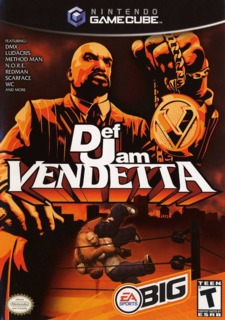Def Jam Vendetta
Def Jam's premise is hard to fault with its abundance of ass-kickin' rappers. Any wrestling ring populated with the likes of Ghostface Killa, DMX, and Ludacris, is arguably a nirvana of violence and hipness. Supporting the (in)famous main attractions are a cartoonish original cast of freaks, including a particularly judgmental minister, Ruffneck the Confederate Redneck, and a crazed clown. The grapplers battle to the tunes of Def Jam records and the running commentary of Funkmaster Flex. The mood and style are, one might say, the hizzle fischizle.
The core AKI gameplay is almost entirely intact, with animations identical to earlier games. The now-classic fighting system is intuitive and deceptively strategic, offering a variety of paths to victory. To perform a maneuver, simply tap the grapple button for a quick attack or hold it down for a riskier palette of punishing effects. A similar logic works for the striking system, essentially placing a massive amount of control into a few buttons. A limb-specific damage system lets you pick out a method of submission, or simply power-up your "blazin'" move to smack that dude up. These "blazin'" finishers are wondrous physical impossibilities, your sports entertainment fantasies come true. Make no mistake, watching Method Man and Red Man execute a spike piledriver on Keith Murray provides true bang for your video game buck. (I could slap Keith Murray for days.) The good vibes end there, though, as the limitations of Def Jam Vendetta begin to reveal themselves.
There are four match types on Def Jam Vendetta. That's right, not seventy-eight, FOUR! They include the standard one-on-one, tag, handicap, and free-for-all bouts. Forget cage matches or ladder matches my grappler couldn't even walk up the rampway. The venues for the "underground, organized street fighting" include junkyards, rooftops, clubs, and under "Da Bridge" but none are interactive in any mode.
Another wrestling game mode that has become standard is create-a-wrestler. In this feature, Def Jam Vendetta shoots even more blanks. With the number of over-the-top taunts and stylish outfits available, this mode could have been money. No dice! In the story mode, you have the option of trading cash winnings for improved stats and winning new outfits, but stat improvement is the bastard stepchild of real creative freedom and nowhere near as much fun.
To make up for this apparent lacking is the showpiece of Def Jam Vendetta: the aforementioned story mode. Your deadbeat pal Manny needs you to help him get out of a little financial crisis, see? D-Mob (the man, not the organization) wants his money from Manny, and what's worse, that big bald dude stole ya' woman and you gots to get her back, yo. How? Prove you're a bigger, sweatier man and body slam the spittle out of a variety of colorful opponents as you receive plot-heavy e-mail on your beeper. The mode itself has polish and has a nice script (D-Mob: "Get ya five dolla ass outta my face before I make change!") The GameCube's cutscenes are a little grainy compared to the PS2, but it's barely noticeable. In order to unlock all the characters, you'll have to play through the story several times with different fighters. It's exactly the same no matter who you choose, though, and I found it a little dull for replay.
The graphics for both the in-ring action and story mode are consistent and refined. The GameCube's graphics look more clean that their PS2 counterparts, but are otherwise identical. The environments and crowds are well-realized and moody. One odd note about the animations, though, is that no visible damage occurs. With an area-specific damage system, it would have been nice to see a character hold his wounded arm or limp as you worked over his tender joints. These damage indications existed in early AKI games, but here they are strangely absent.
Another notable absence is weapons. You heard me right: No weapons! I suppose they could have substituted pro-wrestling standards with more street fighting appropriate tools (brass knuckles or a platinum album, perhaps), but there is no weaponry or interactive object of any type in Def Jam. I would have settled for a steel chair. A wrestling game without steel chairs is like Maxim magazine without the cover girl.
Sounds in Def Jam Vendetta work well, relying mostly on the soundtrack. The in-game music is looped without lyrics, and Funkmaster Flex's play-by-play commentary has energy, but isn't particularly quotable or funny. Luckily, the menu screens have full-blown songs, blissfully carrying the player from match to match with attitude to spare.
Even with all its flaws, Def Jam Vendetta is the best wrestling game currently on the market. The AKI engine is still unmatched, and the story mode has flair. Wrestling and rap is an ingenious hybrid and playing with pals certainly brought out this white boy's inner-gangsta. The baffling incompleteness of the game will hopefully will be corrected in the inevitable Def Jam Vendetta 2.

